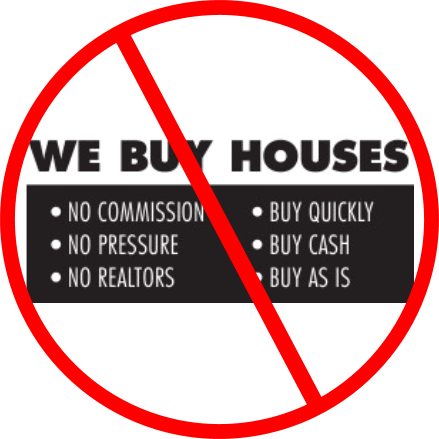Every day we field calls from sellers checking on what they can do to their home to increase the home’s value prior to sale. These questions center around improvements such as solar (we don’t recommend) painting (yes!) flooring and so on. Yet one of the biggest forfeitures of value is “to whom†and “how†we sell.
around improvements such as solar (we don’t recommend) painting (yes!) flooring and so on. Yet one of the biggest forfeitures of value is “to whom†and “how†we sell.
To whom we sell. End users always pay the most for any product – whether a home or a car. It has the highest value to them as they are the ones with the need. Selling to an investor typically brings a lower value because they are not the end user and there is no emotional connection to the home. Owner occupants pay more – but even amongst those buyers the value can vary widely depending on how motivated they are and how limited their other options are (i.e. if the home serves a particular need such as dual master bedrooms, handicap accessible, a certain school district, etc.) In negotiation, the concept “he who needs the deal the most, gives the most†proves true.
How we sell. When we sell with no competition value typically drops. The very premise behind capitalism is that an open market sets pricing. The smaller the pool of buyers exposed to your home, typically the smaller the value. In other words, you can artificially hold down demand by limiting exposure to your home. By owner sales and direct to owner investor offers fall in this category.
Even homes that must only sell to an investor (severe property condition issues or tenants on long term leases) will obtain higher values if they pay attention to “how they sellâ€. In short, the way to get top dollar is to expose the property to the most available buyers. If an investor is the only option as a buyer, creating competition amongst those investors will typically better protect value. What most sellers don’t know is that those investors flooding your mailbox with “we will buy your home†offers – will also make offers to listed homes that meet their criteria. That is good news for sellers wanting an investor offer as a good listing agent can attract multiple investors and make them compete on price and terms for the home. Also a listing agent can help the seller understand the real costs behind the “you pay nothing†investor offers. Anytime venture capitalists are spending millions funding “We buy homes†companies, you can be assured you are NOT receiving a “no cost†offer for your benefit. Venture capitalists only spend money when they believe there is plenty of money to be made for them. Who is paying them? The often unsuspecting home owner is paying them in lost equity.
Don’t believe us? Let us give you a real life example of an offer we received on one of our seller’s homes:
Opendoor used a team of local real estate professionals and a proprietary valuation model to determine their offer on your listing at 16947 Durango St:
- Valuation: $230,000
- Service charge, to cover holding costs and liability while finding a buyer: $17,250
- Net offer price: $212,750
- Opendoor cannot purchase this listing if it has the following features: unpermitted additions, leased solar panels, in a gated or age-restricted community
…. The net offer does not include the buyer’s agent commission.
Opendoor will have inspections performed by a licensed, independent home inspector and will submit a Repair Addendum like a traditional buyer… Â
The service charge is 7.5% for the listing side, which does not include the buyer commission that must be paid (in this case 3%). Those percentages are well above anything we charge in commissions. This makes the claim “save on commissions†dubious at best. But you decide if this example looks like a “savings†as we listed and sold this very house for our seller. Here is what happened when we placed it on the market:
Russell Shaw Sale
Sales price:Â $234,900
Commission: 6% (3% + 3%)
Time on market: 20 days; 33 day close
Sales price vs. list price : full price
Repairs required to close:Â 4 minor repairs
vs.
Open Door
Sales price: $230,000
Commissions and/or holding costs – 7.5% + 3 % = 10.5%
Time to close: 14-60 days
Repair required to close: unknown; “Open door will itemize the request repairs with their cost to have the repair completed and will provide the Seller a credit in-lieu of repairs optionâ€
That resulted in 15K more in the seller’s pocket before Open Door’s “repair negotiation†which often results in additional reductions. This is not to pick on Open Door (or any of their ilk such as Offer Pad, Iknock, etc.) but rather to point out that sellers will always net more on the open market – if their home is marketed to the most buyers possible. If the goal is the most money, shouldn’t this be a last resort and not a first?
Russell & Wendy
(Mostly Wendy)